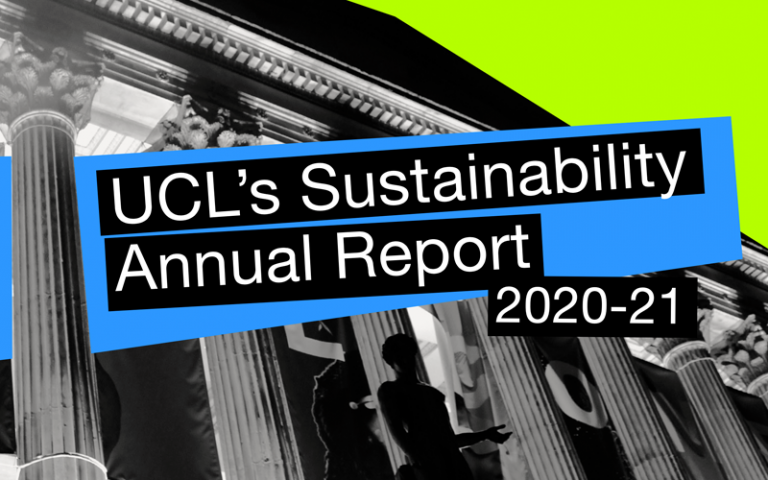UCL's journey towards sector-leading sustainability commitments
22 April 2022
Happy Earth Day! Earth Day is an annual opportunity to demonstrate support for environmental protection. This year we are using Earth Day to share the progress the UCL community made in 2020-21 towards its sector-leading sustainability commitments for 2024.

For more details and stories from across UCL, see the full report
It has been two years since UCL launched its ambitious sustainability strategy “Change Possible”. Since 2019, we’ve seen UCL’s Ahlul-Bayt student society foster inter-faith climate action, UCL create its first zero carbon building and UCL’s sustainable labs programme (LEAF) go global. But as with all areas of our lives, there has been some disruption to UCL’s sustainability activities due to the impact of COVID. Thanks to all our students and staff who have continued to take action for a sustainable UCL despite the challenging circumstances.
Explore the progress UCL’s has made against each of the six sustainability commitments we’ve set ourselves for 2024.
- Every student will have the opportunity to study or be involved in sustainability
We have expanded our curricular offer to enable as many students as possible to engage with sustainability, with 35% of modules in the formal curriculum now referencing Sustainable Development Goal key words.
Students are also taking part in many sustainability co-curricular activities with 1,299 students completing the Green UCL discovery module, 2,000 students attending our extracurricular sustainability engagement events and our Student Sustainability Council going from strength to strength.
- We will increase our sustainability research with an increased focus on the Sustainable Development Goals
UCL research with a focus on the SDGs was cited 1,314 times in 2020 and 843 times in 2021. You can read about the extent of SDG-related activity across the university in the first SDG report here.
- Our buildings will be net zero carbon by 2024 and by 2030 our institution will be net zero carbon
Since launching the sustainability strategy, UCL has gone 48% towards meeting its target of having zero carbon buildings and 17% towards its target of being a zero carbon institution by 2030. 2021 also saw the opening of UCL’s first net zero building – PEARL, which is producing so much solar energy that at times we are exporting it to the national grid.
- Be a single-use plastic-free campus
- UCL launched its plastics reduction database and baselined its total single use plastic consumption. Along with many actions in our laboratories to reduce plastic waste, we also removed cling-film from UCL’s refectories and cafes, saving an estimated 35,000 metres of cling-film per year.
- Reduce waste per person by 20%
- Sustainable UCL have worked with the environmental charity Hubbub on a recycling campaign to inspire students and staff to recycle better, starting in select areas of the UCL campus where we can make the most impact. So far, we have reduced waste per person by 85% due to the UCL community working and studying largely away from campus. Home working has also led to a change in printing practices helping to achieve an 88% reduction in printing, that’s a saving of 30 million pages and 1,830 trees.
- We’ve committed that by 2024, we will have created 10,000m2 extra biodiverse space - increasing wellbeing and reducing the impacts of pollution
By consolidating deliveries, re-routing vehicles and delivering post using cargo bikes, we’ve reduced the number of vehicles on UCL’s main campus by 90% To support people cycling to campus we’ve installed 118 cycle racks, creating over 1,000 parking spaces across UCL.
The newly refurbished Astor College has a blue roof, designed to store rain water and then gradually release it, as well as new planting. This is alongside smaller planting projects across UCL.
Staff and student led gardens are thriving across UCL including the roof top garden above the Ear Institute called ‘It’s good up Ear’ as a place for relaxation and recreation. They created a sustainable space by making planters from discarded wood pallets, diverting rainwater to use for watering, and encouraging wildlife through insect hotels.
Dr Michael Spence AC, UCL President & Provost on UCL's sustainability goals:
“As we become increasingly aware of the scale of the global sustainability challenge that faces our society – the climate crisis, resource depletion, biodiversity loss – so we look to major institutions like UCL to understand, enable and catalyse our global response
What will you do?
The time is now! We have two more years to meet our 2024 sustainability commitments, so we need your help to make them happen.
- Students
- Professional Staff
- Senior Management
- Sign your department up to 100% vegetarian catering
- Sponsor sustainability work in your divison or faculty and develop a sustainability plan
- Academic Staff
- We will be setting up a Communities of Practice for staff to support each other in embedding Education for Sustainable Development into modules and courses, if you would like to join, please get in touch with Hannah Biggs. See here for more information on Education for Sustainable Development, and how you can embed sustainability in your curriculum.
- View the UCL Climate Hub, for information on UCL’s research, teaching and action on climate change.
- Please tag your modules with ‘climate’ or ‘sustainability’ so we can track UCL’s progress on embedding sustainability into the formal curriculum.
For more details and stories from across UCL, see the full report
 Close
Close

